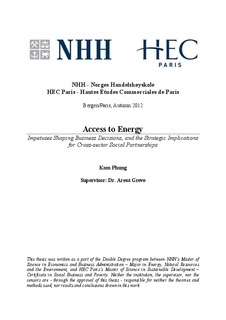Access to energy : impetuses shaping business decisions, and the strategic implications for cross-sector social partnerships
Master thesis
Permanent lenke
http://hdl.handle.net/11250/169385Utgivelsesdato
2012Metadata
Vis full innførselSamlinger
- Master Thesis [4372]
Sammendrag
This study aims to identify the underlying factors stimulating and shaping companies’ access
to energy activities, and how inter-organizational collaborations can change the rules of the
games. A review of relevant literature revealed that a gap in research approaches exists and
the field lacks theory-based knowledge. In turn, this study followed a theoretical framework
guided by institutional theory for organizations and three schools of thought in strategic
management: the resource-based view, industry-based view and institutions-based view. It
applied a single qualitative exploratory case study methodology and used semi-structured
interviews, member checks, field notes, and triangulated information to collect data. Although
the case studied a France-based multinational operating in Bangladesh, it illustrates the
dynamics of the global field of access to energy. A compilation of five sub-conclusions from
the study indicates that energy companies see access to energy is an attractive field where
energy companies they can use their core competencies to benefit society, practice strategic
corporate social responsibility and create shared value. While partnering with local
organizations is becoming a rule of the game, the rules are still fragmented and under
development, which gives collaborations the opportunity to innovate new practices, policies
and technologies and attain a competitive advantage. Resulting innovations may diffuse
beyond the collaboration and change the rules of the game if the collaboration actively
interacts and shares knowledge with third parties. Overall, this study helps fill a gap in
research approaches and adds theory-based insights to the existing knowledge base on the
topic of access to energy, as well as the umbrella topic of the corporate social responsibilitydevelopment
nexus.
